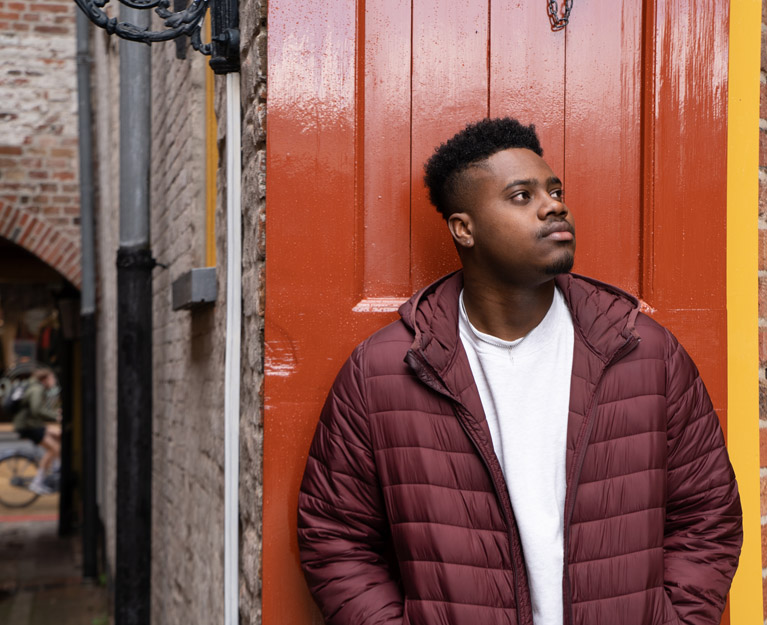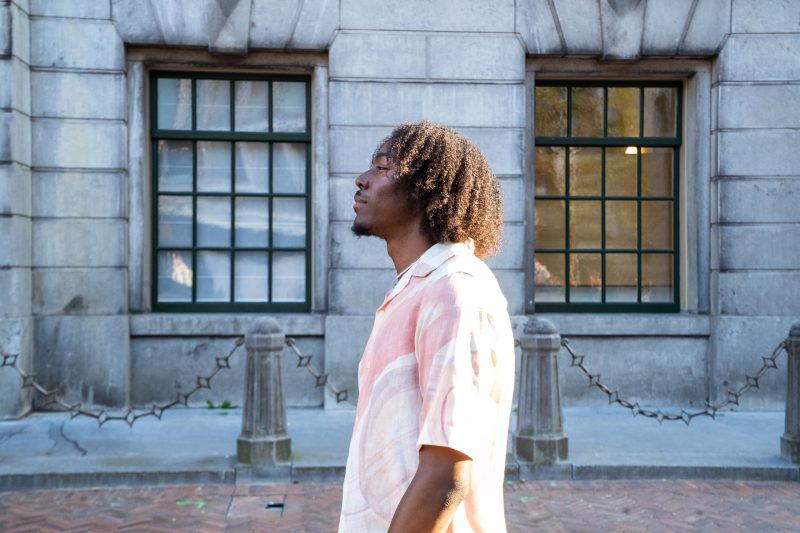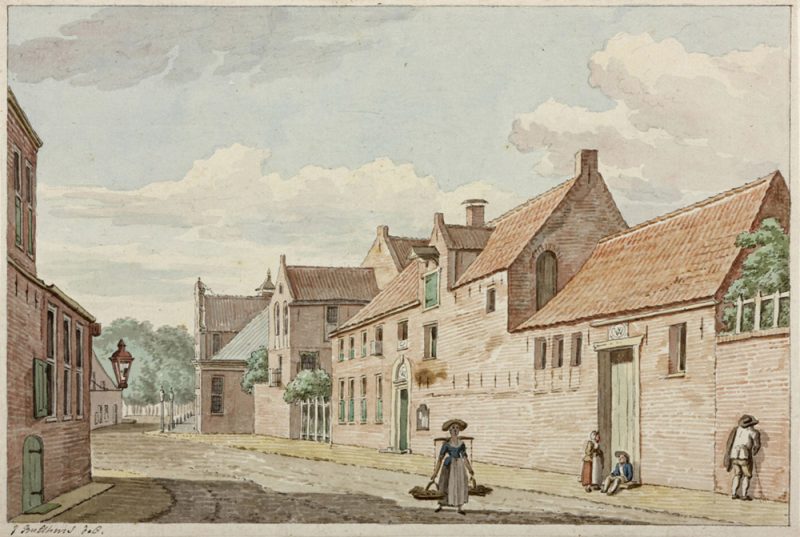
The Antilles
Practicality wins out over emotion
It was 2009. In an apartment in Willemstad, Dijon Felida, a nine-year-old boy, and his family were watching the news on the TV with bated breath. What was it going to be this time? Would Curaçao finally break free? Or would the results yield in favour of joining the Netherlands?
That day, on what was already the second referendum, Curaçao voted to become an autonomous country, a constituent of the Kingdom of the Netherlands. On October 10, 2010, the Netherlands Antilles was dissolved.
‘We celebrated for a whole week in Willemstad’, Dijon, now an international business student at the Hanze University of Applied Sciences, recalls. There was even a party on a former plantation, called Hofi, where in the 1700s mangoes and sugar cane were grown with slave labour.
‘I remember my brother and I were in the scouts at the time, and he was the one to take down the flag of the Netherlands Antilles and put up the Curaçao one’, Dijon says. ‘Of course we were happy. Being autonomous was the mindset we grew up with. My parents would always say joining the Netherlands would be like losing the rights we barely gained. Now, we are the middle ground.’
Privileges
To Dijon, it’s not about breaking all contact with the Dutch, but fostering a relationship with them, because that also means having certain privileges. ‘The colonial past is in the past. I don’t think it will ever be a clean slate, because it shaped us in the way we are. But I can’t judge the people because of their past’, he says.
We are given a unique hand, so let us use it
He’s not the only one to think so. Tyra Els, a 26-year-old international and European law student from Sint Maarten, believes the relationship with the Dutch can benefit the people from the islands.
‘My strongest feelings are about our right to take advantage of what is available to us, to better our country. We are given a unique hand. We have Dutch passports and access to top universities of the world’, she says. ‘So let us use it. Let us not get wrapped up in the past. Let us make sure our path is respected, but also do what we have to do to ensure a future, not only for us but for the next generations.’

Impact on the present
But is it so easy to avoid getting wrapped up in the past? After all, the islands had endured much suffering under Dutch colonialism.
To Alex van Stipriaan, professor of Caribbean history at the Erasmus University of Rotterdam, this past is still very much alive. ‘You can’t underestimate the impact of colonialism on the Dutch Caribbean, because it’s all over the place. It’s still very influential in politics, in the way people relate to each other, in why students come to the Netherlands’, he says.
It all goes back to the indigenous population of the islands, he explains, who were mostly driven out, murdered, or killed by diseases brought from Europe. ‘While Indonesia was already highly populated, the Caribbean was repopulated and formatted by the Dutch. A completely new society was built up from scratch. Colonialism is at the basis of these communities’, he says.
That’s why its impact is still reflected everywhere, from the composition of the population to the landscape and the architecture of typical Dutch houses, especially in Curaçao. After eradicating the island’s natives, the population was created artificially, by bringing slaves to the islands. Nowadays, it is very diverse, as an estimated 40 percent are descendants of migrants who arrived on the island during the last one hundred years from countries like Venezuela, Syria, or even China.
Racism
Knowing all this, one might expect the students from the Caribbean to be quite unforgiving. And while that is not the case, many of them do have a love-hate relationship with the Netherlands. In fact, neither Dijon nor Tyra planned to study here. And that’s mainly for one reason: racism, a long-lasting legacy of the colonial past.
Colonialism is at the basis of these communities
Tyra was seven years old when she first experienced racism. It happened in Groningen, where she often came with her mother and her sister, because of a genetic condition that she was getting treatment for at the UMCG.
‘It was just me and my sister then. We were at the ATM when an older Dutch guy passed us by and called us apes. I was just confused. There was no confrontation or anything, it came out of the blue’, she says. ‘But it made me realise that I never want to live in a country as a second-class citizen.’
Dijon hasn’t experienced racism firsthand since he came to the Netherlands two years ago. But he heard a lot about it growing up from the students who were on national TV in Curaçao, or his cousins who had studied here before. ‘I actually didn’t want to come because of that. I never experienced racism and I just didn’t want to deal with it’, he says.
Smarter choice
So why do 1,600 or so Caribbean students come to the Netherlands every year despite such grim expectations?
‘It’s a choice between the heart and the brain. The heart says to get away from those who have oppressed them for so long. And the brain says it’s in many respects more favourable from a commercial and financial viewpoint’, Van Stipriaan says.
‘It’s easier and smarter in the long run’, argues Ariana Valeriano, a 21-year-old Minerva student from Curaçao. ‘It’s expected of you to come to the Netherlands. Even the high schools in Curaçao prepare you for that.’
During high school, Ariana recalls having workshops on Dutch culture, their habits, and their immovable traits, like punctuality. ‘I’m grateful because I knew what to expect, but it seemed unfair to learn about the habits of the colonisers, like you wouldn’t have learned enough hundreds of years ago.’
Superiority complex
She also couldn’t help but feel like there are certain double standards. ‘When we come here, we are expected to adjust. But when the Dutch come to Curaçao, they don’t even have to try’, she says.
It seemed unfair to learn about the habits of the colonisers
Ariana remembers having a classmate, a girl born and raised in Curaçao, but of Dutch parents. ‘She never learned Papiamentu, the local language in Curaçao. And teachers would make exceptions for her in Papiamentu class’, she says.
Van Stipriaan recognises that there’s a certain superiority complex characteristic to the Westerners, the Dutch included. ‘It’s a form of internalised racism, a legacy of the past. But actually, most Dutch people aren’t even aware of it.’
‘To Westerners, unconsciously, they have proved their superiority every day. They still hold power in the world. So it links up easily with former ideas of racial superiority. Race is not a biological category anymore, but as a social construct, it’s still very much alive’, he explains.
Ignorance
While students from the Caribbean are used to expecting things like discrimination or white privileges and are cautious about them, what surprises them most is the lack of awareness of their Dutch counterparts on their shared history.
Dijon recalls having to explain to some of his colleagues at work where Curaçao is. ‘I’ve seen a lot of ignorance. I feel like they don’t teach kids about their history, because people would be quite surprised that I can speak Dutch or that our school system there is in Dutch’, he says.
And he’s not the only one to have noticed. Tyra was once getting a facial from her Dutch cosmetician, who was very surprised that she wouldn’t speak Dutch. While Dutch is one of the official languages in Sint Maarten, only 4.2 percent of the population speaks it and English is used in everyday life.
Eventually, Tyra’s cosmetician asked one of her colleagues how that was possible, and she answered that Sint Maarten is not Dutch, it’s French.
‘How can you not know that Sint Maarten is also Dutch?’ Tyra thought. She didn’t say it out loud, though, just as she kept silent when one of her Dutch friends got upset that Mark Rutte, then prime minister, publicly apologised for slavery.
‘She felt like he had better things to do, like the housing crisis. She also kept saying that it happened 400 years ago, until I told her it actually stopped only 150 years ago. But she was still disappointed. And she wants to become a politician’, Tyra says. ‘I’ve kind of gotten to a place of peace with it though. Because, how can you have a true feeling for something if you don’t know it?’
Education system
However, others like Ariana are still fighting to make peace with that. ‘We had to learn about slavery and everything that comes with it for three years. We had to know all these Dutch names and so much about the Netherlands itself. Then, most of them don’t even know the basics about our suffering. And that really hurts me.’
Most Dutch people don’t even know the basics about our suffering
Van Stipriaan explains this by pointing to the education system. ‘Until the 1990s, there weren’t more than a few sentences about slavery and colonialism in a history class’, he says. ‘Now, in theory, every Dutch person must have heard about it. But that depends on how much time and attention a history teacher dedicates to the subject.’
Even so, despite being critical, students from the Caribbean don’t expect any apologies from the Dutch for the past. Not as long as they’re educated on the topic. ‘I don’t know how to react when that happens. I know they mean well, but what am I supposed to do with that apology?’ Ariana explains.
Family history
The students themselves know the history of colonialism by heart, from books and classes. But, when it comes to their personal history, it’s a different matter. The only thing that Ariana knows about her ancestors is that one great-great-grandfather was a native of the island. ‘My family never talked about this topic. It’s not taboo, but it’s just a painful conversation to have’, she says. ‘I never considered that my family history is also part of this history.’
Lujendel Zieck, a European languages and cultures student who was born in the Netherlands and moved to Curaçao at age ten, doesn’t remember talking much about it within the family, either. Not unless he started asking questions himself. ‘When I was 16 or 17, I found out in history class about one of the biggest tragedies that ever happened in Curaçao: the 1969 Shell riot. That was an age when my grandparents were in their thirties or forties, so I asked my grandma about it.’
Newsreel from 1969 on the uprising in Willemstad, Curaçao
That’s how he found out that his grandfather was somehow involved in the uprising, though Lujendel never found out to what extent. ‘My grandma had a front-row ticket and said it was very unpleasant. But that’s about it. She often told me stories, though never about colonialism or discrimination.’
Ancestry
Tyra, however, knows more about her heritage. Her aunt, the eldest of the family, started digging into their family tree years ago. Piece by piece, she traced back their ancestry to an enslaved woman from Cul de Sac, though she couldn’t find out much more about her origin.
‘If it’s not shared with the next generation, it will all be lost. That’s why I appreciate my family taking the time to share these roots with us, because it’s really all over the place’, she says. ‘I want to know for myself where I come from. Why do I look the way I look? The Caribbean is very diverse, and mixed. I want to know and understand all that.’
But does this family history really matter? Van Stipriaan thinks so. ‘If you drive a car, the rearview mirror is as important as the front window’, he explains. ‘You might learn about who you have become and who your parents have become from that personal history, which is important for the present. It’s like a judge who listens to the story of a criminal, which also involves the story of how they were raised. That’s the past.’

The Netherlands Antilles
For more than two hundred years, the Dutch abducted at least 600,000 adults and children from different parts of Africa. They transported them across the Atlantic to the Caribbean islands, where they were sold as slaves to other colonies on the American continent or forced to work on Dutch plantations, primarily for sugar.
In the late 1600s, Curaçao became the most important market for the slave trade, controlled by the Dutch West India Company (WIC). The Africans who survived the long sea journey would be brought to the island and assessed according to a so-called pieza de Indias, an evaluation of a slave’s labour capacity before being sold into slavery.
The WIC, founded in 1621, held a trade monopoly with the Americas, Africa, and the Atlantic in between. It controlled ports on the West African coast to supply slaves to plantations in the West Indies and South America. The WIC also established colonies in the West Indies and Guyana, though many were later lost to the French, leaving only the six islands and Suriname as Dutch colonies.
Even after slavery was abolished in 1863, the islands continued to be governed as a Dutch colony known as the Colony of Curaçao and the Dependencies, later renamed the Netherlands Antilles.
Aruba became autonomous in 1986, followed by Curaçao and Sint Maarten in 2010. The remaining smaller islands, Bonaire, Saint Eustatius, and Saba, became special municipalities in the Netherlands.
This is the second instalment in a series on UG students from former Dutch colonies. Read part one about Indonesia here >